ATLANTA, Ga. — There’s something interesting about the Genesis Electrified GV70, and even though it’s plainly obvious, it’s still worth pointing out: its skin and much of its chassis are basically shared with the regular Genesis GV70. Whereas most other EVs employ a dedicated platform intended to take full advantage of a battery-powered car’s inherent differences, Genesis engineers decided to employ a vehicle architecture that can accommodate both internal combustion and electrification.
This isn’t entirely unique to Genesis. The BMW i4, for instance, shares its modular Cluster Architecture platform with a slew of gas-fueled vehicles. But it’s noteworthy nonetheless, due in no small part to the much-heralded collection of other EVs in the Hyundai Motor Company’s portfolio: the Hyundai Ioniq 5 and 6, Kia EV6 and Genesis’ own GV60, all of which use a dedicated electric chassis known internally as E-GMP. Instead of simply making additional models off E-GMP, Genesis has seemingly invested in a second, bespoke vehicle architecture for itself.
The Electrified GV70 is a couple inches longer than the GV60 but has a wheelbase that’s exactly an inch shorter. The 70 has a little over a cubic foot more passenger space overall, but less front and rear legroom. The 60’s steeply raked roofline cuts into cargo capacity, leaving the 70 to take the stowage crown with 56.5 cubic feet (compared to 54.7) behind the first row and 28.7 behind the second row (compared to 24). Those numbers make the EV version a smidge smaller inside than the gas-powered GV70, in case you’re wondering.
Intriguingly, a look at the specifications between the GV60 and GV70 reveals there’s even more to the story. Both vehicles use a battery pack with a rated capacity of 77.4-kilowatt-hours, and the Electrified GV70’s 429 horsepower and 516 lb-ft of torque match those of the GV60 Performance model (the ponies can similarly be upped to 483 for 10 seconds at a time using the “Boost” button located on the steering wheel). The five-stage regenerative braking and highest I-Pedal modes carry over as well. Turns out there’s more sharing going on between the two vehicles than it seems at first blush.
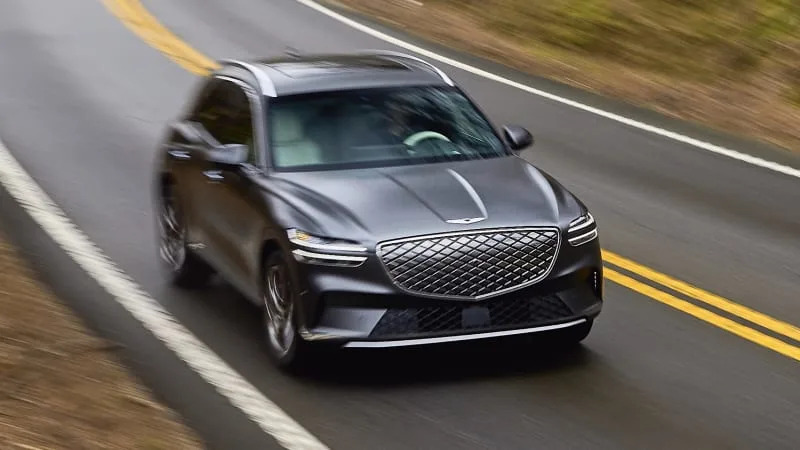

Whatever the reasoning behind the decision to share some bits and pieces between models but not others, we’re quite pleased with the results. The Genesis Electrified GV70 is at least as attractive as the regular GV70, perhaps even more so due to its unique detailing, which includes a new grille, wheels and faux skid plates front and rear. Obviously, the exhaust outlets are also deleted. Its swooping bodysides and flowing roofline — Genesis calls them “parabolic-” and “athletic power lines” — look elegant, sophisticated, and unlike anything else on the road. Perhaps even better is the interior. As is the case with the standard GV70, the Electrified model boasts plenty of fluid lines, beautifully stitched leather and jewel-like switchgear that both make a luxurious statement and stands apart from its more staid German competitors.
Both inside and out, the Genesis Electrified GV70 certainly exudes the marketing keywords the brand aims for: audacious, progressive and distinctly Korean. We’re especially fond of the Glacier White interior color (copper accents are added with the optional Prestige trim), and Genesis designers hinted that more interesting colors, both inside and out, will follow in due time. That’s a good thing, considering that the only exterior shades at launch will be shades of black, silver, gray and matte gray. You can get the regular GV70 in purple, green and candy apple red.
Like the Electrified G80, which shares the same gas/electric platform, the Electrified GV70 (yes, we find this naming convention just as clunky as you do) features what we think is the coolest charging door in the EV kingdom. Since electric powertrains don’t have big radiators up front, Genesis fills in the crest-shaped grille with a diamond pattern, and one hidden bigger diamond on the driver’s side of the grille flips open to reveal the charging port. Its location at the front of the vehicle makes it relatively easy to plug in, too – you won’t have to back into spots as much and short charging cords won’t be as big of a hassle.
Due to its advanced battery and 800-volt electric architecture, the Electrified GV70 can take advantage of 350-kilowatt chargers (though its actual peak charging rate stands at 240 kW) and theoretically charge from 10%-80% in as little as 18 minutes, though real-world times will vary depending on a number of factors. A 5-minute charge on the fastest chargers can give a 64-mile boost. On a 240-volt home charger, Genesis estimates it will take around 7 hours to fully charge, meaning the car should be full every morning if it’s plugged in at night. There’s also vehicle-to-load capability that requires an accessory connector and allows the car’s battery to run small 110-volt appliances. It’s not exactly a generator, but it could save your food from thawing in an outage or run garage tools. Genesis estimates at full charge the Electrified GV70’s battery could power the average American household for two days.
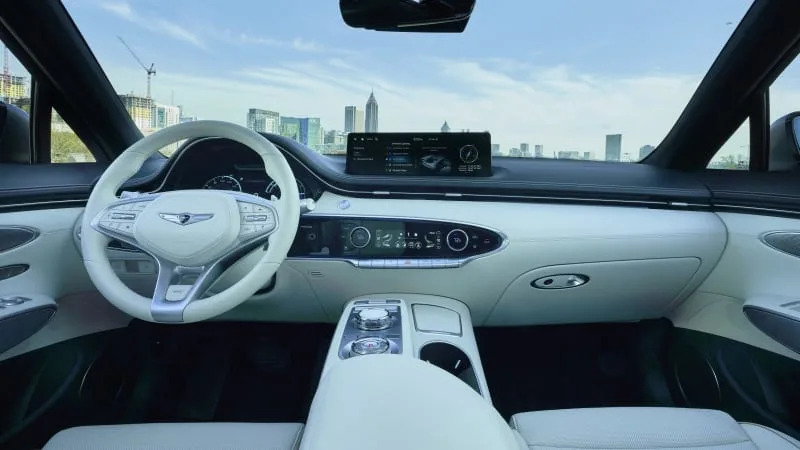
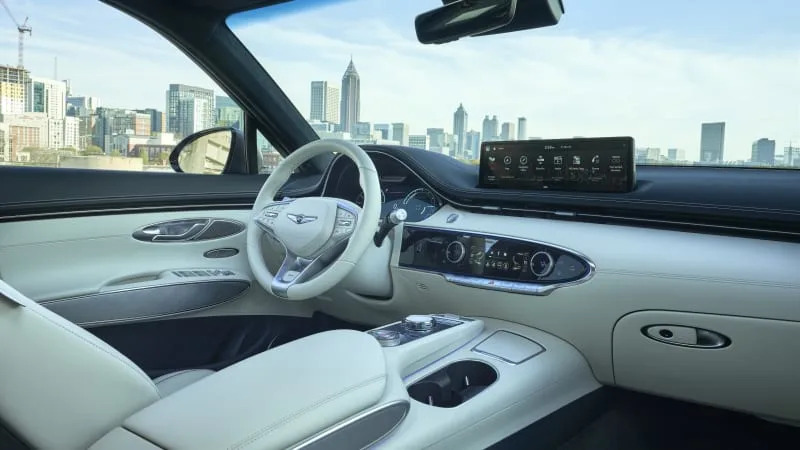
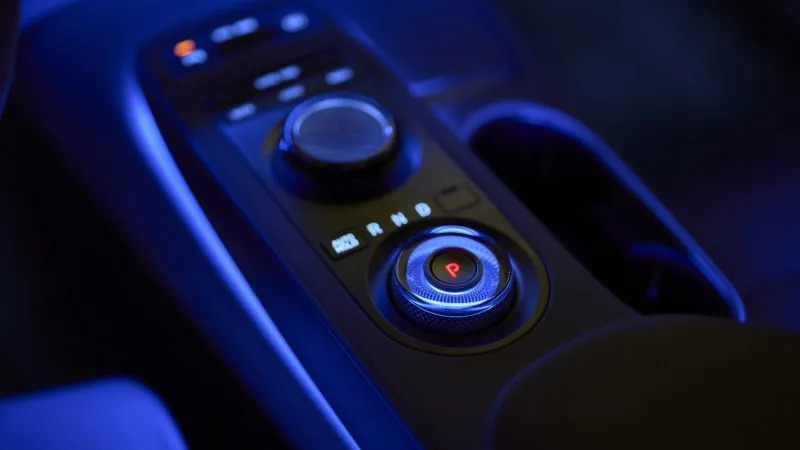
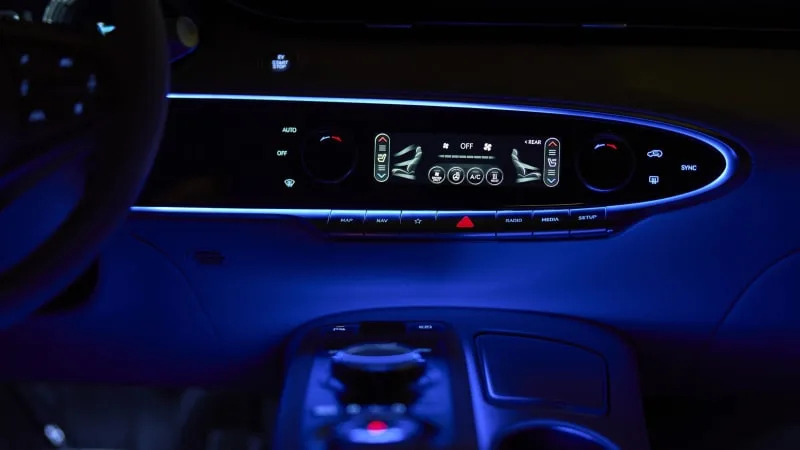
Maximum range is estimated at 236 miles. While more than sufficient for all but the most mileage-demanding drivers in America, that’s well short of the rated ranges of some cars it may be cross shopped against, including the Tesla Model Y (up to 330 miles) and admittedly more expensive BMW iX (up to 324 miles). It’s close to the Jaguar I-Pace (246 miles) and higher than the Audi Q8 E-Tron (226 miles). The GV60 Performance, which has the same motor/battery setup as the GV70, has basically the same range. The less powerful GV60 Advanced, however, can achieve 248.
Out in the real world, well … your mileage may and very likely will vary. In normal day-to-day driving, we suspect that 236-mile estimate to be about right. But remember that Boost button? It likely has an effect on range when coupled with a heavy right foot. We used it a lot during our testing — for scientific purposes, of course. After a drive route that Genesis calculated at around 150 miles, our range estimator showed about 31 miles remaining. That would equal around 180 miles, but the last 20 miles of our test was in bumper-to-bumper traffic. And, um, Boost is fun.
In fact, the entire driving experience is a treat. The ride is serene, with zero drivetrain noise or vibration, excellent suspension control and a feeling of solidity likely aided by the Electrified GV70’s roughly 5,000-pound weight (a whole fifth of that being the battery pack). The standard 20-inch wheels wear 265/45R20 Michelin Primacy Tour A/S tires that are designed more for comfort and efficiency than outright roadholding.
Using buttons on the console, the driver can select from Comfort, Eco or Sport modes, and a Custom mode lets the driver set their own preferences. Comfort can be thought of as the default mode, and it’s appropriately tuned as such with progressive throttle response and a posh ride. Sport mode makes a noticeable difference, particularly due to its ramped-up acceleration mapping, but prospective buyers should be aware that the Electrified GV70, like other GV70 versions, is most certainly not meant to be a performance-oriented SUV. It’s better suited to relaxed, quietly luxurious motoring. Refined is a good word to use about the overall Electrified GV70 experience.
The Electrified GV70 benefits from Electronically Controlled Suspension with Road Preview, which uses a camera pointed at the road ahead to automatically adjust firmness to road conditions. Genesis cautions that the system doesn’t work at night and requires the cameras to be clear of debris, but since our drive took place in the sunny climes of Georgia, we can’t comment on how the ride may be altered when it isn’t engaged. In any case, we were comfy in both the driver and front passenger seats on our 150-mile loop.
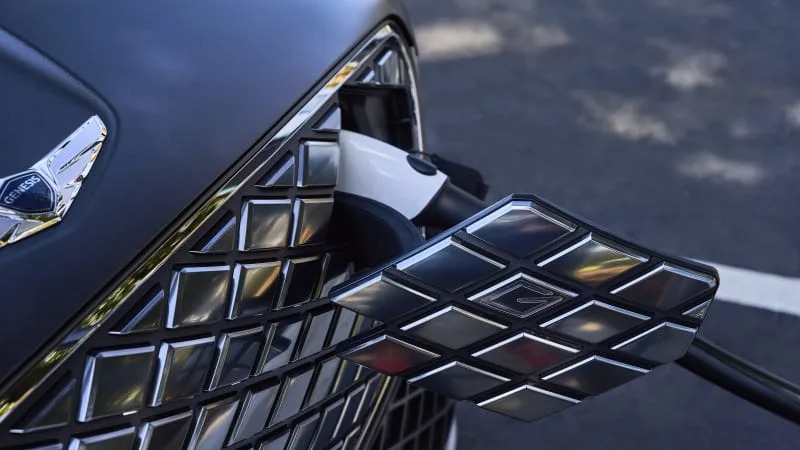
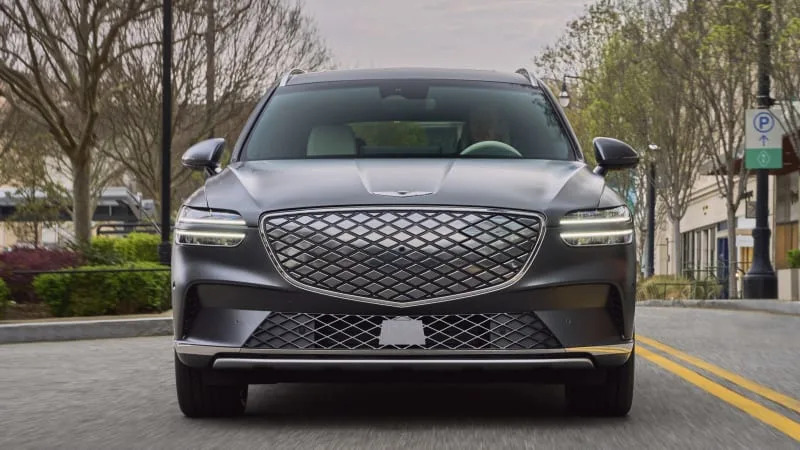
Autoblog contributor Lawrence Ulrich, who spent time behind the Electrified GV70’s wheel after a tour of its factory in Alabama, had this to say: “On a curling freeway overpass, we rock the GV70 into the triple digits, and it’s not breaking a sweat, spewing exhaust or slurping fuel at less than 20 mpg — as does the V6-powered GV70 when it’s driven aggressively. Steering feels a bit chilly, as with most EVs. But the electric version maintains the GV70’s people-pleasing balance of soothing ride and secure control: It’s not a corner-carver like the Porsche Macan, Jaguar F-Type or Alfa Romeo Stelvio, but plenty sporty when called upon.”
Ulrich similarly praised the interior. “So as in the ICE version, the GV70’s swanky cabin feels two full cuts above a Tesla Model Y or Ford Mustang Mach-E. The GV70 also reads richer than compact-luxury rivals from Lexus, BMW, Volvo, Acura, Cadillac or Alfa Romeo — especially in eye-snaring trims like Glacier White, with its tuxedo-formal, black-and-white dashboard and snowy leather upholstery, steering wheel and door trim. Inside, the electric model gets a sustainable faux-suede headliner, a cross-hatched leather pattern on seatbacks, mildly reworked digital driver’s gauges, and additional readouts on its widescreen, 14.5-inch HD display for electric data, charger locations and the like.”
One interior gotcha that’s bound to catch you off guard: the infotainment controller and the shift knob are rotary dials located right next to each other on the center console. More than once, we spun one when we wanted to spin the other. Hopefully that’s a niggle that goes away after a few months of ownership. On the positive side, Genesis’ infotainment remains excellent. Graphics on the 14.5-inch screen are crisp and colorful, there’s no lag when moving between menus or making selections, and it’s not terribly difficult to find the setting you’re looking for. Between the steering wheel, dash and console, most of the most frequently used functions have some sort of tactile switch, button or knob, which we appreciate.
Both active and passive safety systems abound and are standard across the range. We appreciated the Highway Driving Assist II tech that provided a less stressful experience in traffic, actively keeping us in the middle of our lane and at the proper distance from the car ahead, as well as automatically changing lanes after being called upon by the turn signal. It’s not actual self-driving, but neither is anything else currently on the market. In any case, it too is standard equipment.
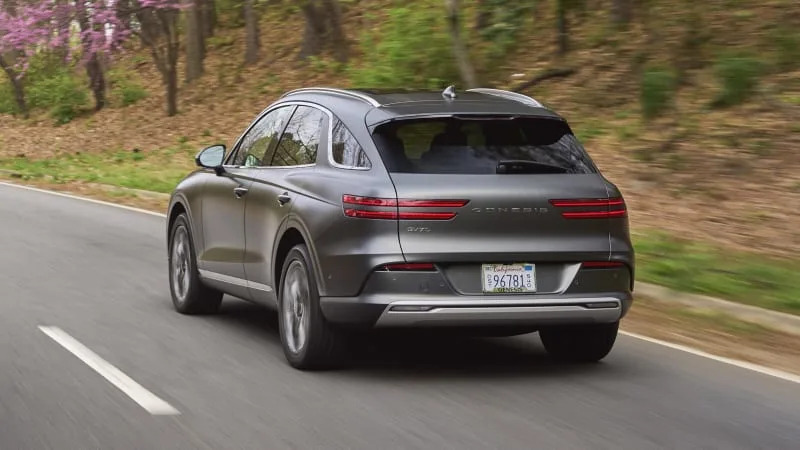
So it seems we’re pretty smitten with the Genesis Electrified GV70. We may not completely understand the Electrified GV70’s place alongside the similarly sized but cheaper GV60 or the reason why Genesis chose to place its electrified eggs in two disparate baskets with vastly different underpinnings. But we’re not mad about it. The base price of the Electrified GV70 sits at $65,850 and is a solid overall package. The uplevel Prestige trim adds an additional $6,800 and includes a host of luxurious kit like Nappa leather on the seats and dash, a microfiber headliner, larger 12.3-inch 3D digital gauge cluster in place of the standard 8-inch unit, a head-up display, heated rear seats and active noise control. We’d say that’s a solid value.
We like the slightly more compact GV60 quite a bit, but the overall Electrified GV70 package feels like it’s worth more than the actual $6,000 premium over its smaller-numbered sibling. As an added bonus, at the time of this writing, the made-in-America (mostly; the battery is shipped in from Korea) Genesis Electrified GV70 qualifies for a $7,500 federal tax rebate. After our initial 150-mile test drive, we think we like the Electrified GV70 Prestige at its $73,225 price point more than anything it would reasonably compete against. It’s a lot of money, yes, but it’s certainly also a lot of luxury and a lot of performance.
Related video:
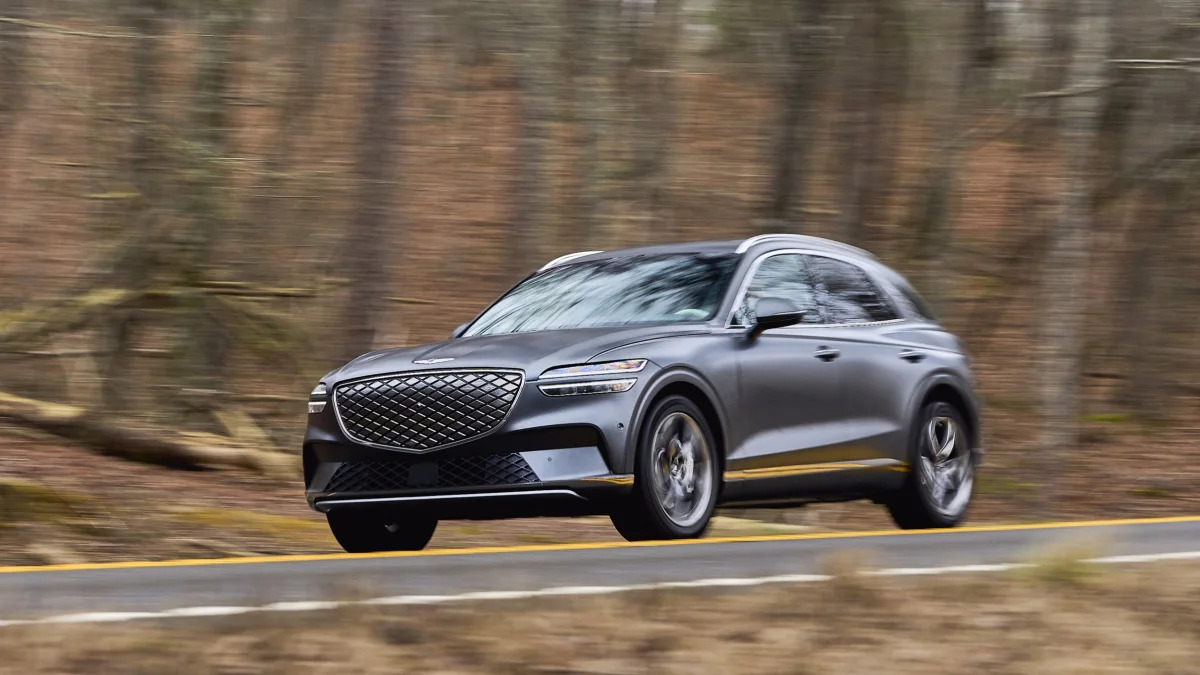































































































Sign in to post
Please sign in to leave a comment.
Continue